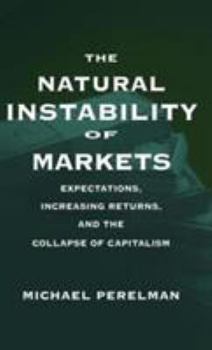The Natural Instability of Markets: Expectations, Increasing Returns, and the Collapse of Capitalism
Select Format
Select Condition 
Book Overview
As Socialist states struggle to transform themselves into market economies and the United States privatizes everything from schooling to policing, the current crises in Russia and East Asia suggest that something might be amiss. In the rush to open societies to the benefits of competition, economists have overlooked the fundamental instability of competitive markets. What had seemed to be an invincible capitalist juggernaut may be reaching its apotheosis...
Format:Hardcover
Language:English
ISBN:0312221215
ISBN13:9780312221218
Release Date:June 1999
Publisher:Palgrave MacMillan
Length:188 Pages
Weight:0.78 lbs.
Dimensions:0.9" x 5.7" x 8.6"
Customer Reviews
2 ratings
Some reviewers have completely missed the point
Published by Thriftbooks.com User , 23 years ago
I think the point of this book was generally clear enough. Those people above who have criticised Perelman's use of analogy to the biological sciences clearly missed Perelman's view of economic systems. Because humans are biological organisms, and because our economic system is a construct of biological organisms, it stands to reason that it would behave much more like a biological system than anything classical economics could ever hope to describe. In order for Perelman to model his thesis in such a way as to please the economic community (which I believe he noted in an early chapter would turn a deaf ear to his book because of its lack of conventional economic argument and modeling) would have required far more print, to far less effect than Perelman has achieved. In a nutshell, Perelman suggests that economics is complex because human beings are complex, because we have a very wide range of perception, understanding, and experience to inform our economic choices. It is a very big idea. And it really suggests something far broader than any economics we can imagine. In order for this discipline to be valuable, HUMAN DECISION MAKING must be modeled. Artificial intelligence. In different terms, Perelman also suggests that current decision-making structures, because they are so narrow (inhuman) are ineffective at dealing with complex problems. Decision making is intelligence. To understand it is to crack the code of AI. No one has done that yet. Readers should also take a look at Herbert Simon's "Models of Bounded Rationality" and "Complex Information Processing" as well as Fritjof Capra's "Web of Life" for more insight into these issues that will supplant classical economics. I'd give it five stars, but Perelman raises more questions than he answers, so I'll give it four.BTW, I should note that his explanation for market volatility rests on the premise that decision-making apparati are deficient for these reasons.
An incisive critique of conventional economic wisdom.
Published by Thriftbooks.com User , 25 years ago
Unlike most conventional economists who assume that the self-equilibrating properties of their models are replicated in the global economy, Michael Perelman demonstrates the inherent instability of unfettered capitalism. Like Thorstein Veblen's "Absentee Ownership", Perelman demonstrates how the lack of intervention and regulation compounds market volatility. It is a lesson not lost on major players such as the World Bank, which speaks of a "crisis of state effectiveness" and recognizes the damage caused by speculative whim. Perelman's characterization of markets as inherently unstable garners support, however unintentional, from no less a source than US Treasury Secretary, Larry Summers, whose recent pronouncements have focused upon the need for concerted efforts aimed at promoting stability. These efforts will, of necessity, originate from non-market sources. Of course Summers and the World Bank differ from Perelman in their solutions, but this is hardly unexpected, given their advocacy and implementation of policies responsible for heightening economic instability in the first place. At a time when US economic health appears to depend somewhat disproportionately upon the wisdom of another notably non-market institution, Alan Greenspan, Perelman's book offers a welcome injection of critical objectivity. It is well-argued and accessibly written. It deserves a wide readership.






